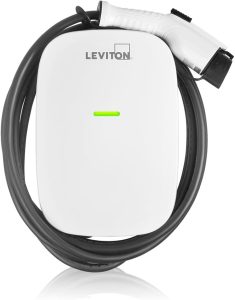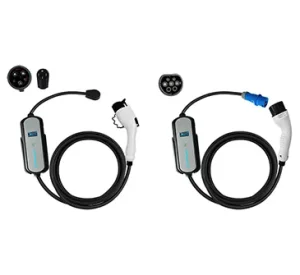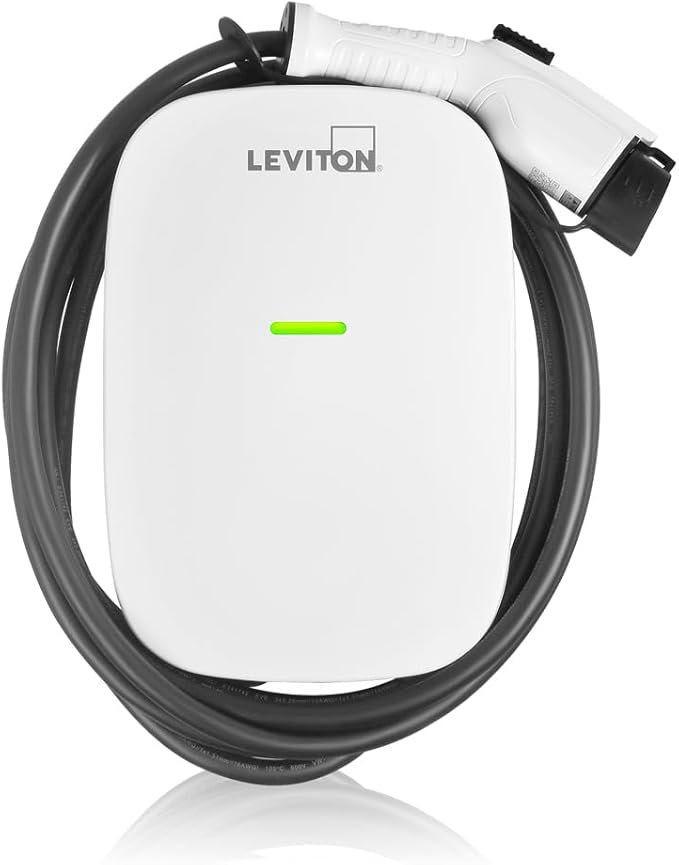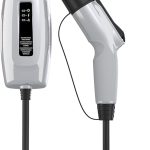As electric vehicles (EVs) become increasingly popular, more households are opting for Level 2 chargers to meet their daily charging needs. Among the many options, 32 amp EV chargers stand out for their efficiency and affordability, making them a top choice for many families. This guide provides an in-depth look at the definition, functionality, benefits, comparisons with other chargers, installation requirements, and top models of 32 amp EV chargers to help you make an informed decision for your home charging setup.
What is a 32 Amp EV Charger?
A 32 amp EV charger is a Level 2 charging device designed to deliver up to 32 amps of current at 240 volts, providing approximately 7.6 kilowatts of power. Compared to Level 1 chargers (120 volts, 1.4-1.9 kW), it offers significantly faster charging speeds, though it is slightly slower than 40 amp or 50 amp Level 2 chargers.
-
Charging Speed: Adds approximately 25-30 miles of range per hour, ideal for overnight charging or daily commutes.
-
Compatibility: Uses the standard J1772 connector, compatible with most EVs; Tesla owners can use an NACS adapter.
-
Use Case: Perfect for households seeking a balance between charging speed and cost.
According to EV Adept, 32 amp chargers are a popular choice for home charging due to their compatibility with most residential electrical systems.
How Does a 32 Amp EV Charger Work?
A 32 amp charger connects to your home’s electrical system to deliver power to your EV. Here’s how it works:
-
Power Source: Requires a dedicated 240-volt circuit, typically powered by a 40 amp breaker.
-
Power Output: Operates at 32 amps and 240 volts, delivering 7.6 kW.
-
Charging Process: The charger communicates with the EV via the J1772 connector to determine the maximum charging rate and supplies power at up to 32 amps.
-
Safety Features: Equipped with overcurrent protection, ground fault detection, and temperature monitoring to ensure safe and efficient charging.
For example, the Leviton EV320 incorporates advanced protection software to prevent overvoltage, undervoltage, and overheating issues.
Benefits of Choosing a 32 Amp EV Charger
32 amp chargers are a popular choice for home charging due to their numerous advantages:
-
Faster Than Level 1: A Level 1 charger takes 8-12 hours to fully charge a 60 kWh battery, while a 32 amp charger requires only 4-6 hours.
-
Cost-Effective: Lower purchase and installation costs compared to 40 amp or 50 amp chargers.
-
Broad Compatibility: Compatible with most EVs, such as the Tesla Model 3, Nissan Leaf, and Chevrolet Bolt, which typically support 32 amp charging.
-
Minimal Electrical Upgrades: If your home already has a 240-volt circuit (e.g., for an electric dryer), installation may not require panel upgrades.
-
Future-Proof: While not as fast as higher-amp chargers, 32 amp chargers meet the needs of most current EVs and will remain practical for years to come.
According to SolarQuotes, 32 amp chargers deliver approximately 7.4 kW on a single-phase circuit, sufficient for daily driving needs.
32 Amp vs. 40 Amp vs. 50 Amp Chargers
Understanding the differences between amperage ratings is crucial when selecting a charger. Here’s a comparison of 32 amp, 40 amp, and 50 amp chargers:
|
Charger Amperage |
Charging Speed |
Required Breaker |
EV Compatibility |
Best Use Case |
|---|---|---|---|---|
|
32 Amp |
25-30 miles/hour |
40 amp circuit |
Most EVs |
Daily commutes, overnight charging |
|
40 Amp |
35-40 miles/hour |
50 amp circuit |
High-rate EVs |
Faster charging, larger batteries |
|
50 Amp |
40-45 miles/hour |
70 amp circuit |
High-performance EVs |
Future-proof, ultra-fast charging |
-
32 Amp Chargers: Ideal for most households, balancing speed and cost with straightforward installation.
-
40 Amp Chargers: Suited for EVs with larger batteries or users needing faster charging, but require a more robust electrical system.
-
50 Amp Chargers: The fastest option for home charging, but often overkill for most users and more expensive to install.
Recommendation: Check your EV’s manual to confirm the maximum amperage its onboard charger supports. If it’s limited to 32 amps, a higher-amp charger won’t increase charging speed. EvoCharge advises selecting a charger based on the vehicle’s acceptance rate to optimize performance.
Installation Requirements for a 32 Amp EV Charger
Installing a 32 amp charger requires careful planning to ensure safety and efficiency. Key requirements include:
-
Electrical Requirements:
-
Requires a dedicated 240-volt, 40 amp circuit.
-
Per the National Electrical Code (NEC), the breaker must be 125% of the charger’s rated current (32 * 1.25 = 40 amps).
-
Wire Size: Use 8-gauge copper wire (AWG 8) to safely handle the current.
-
-
Installation Type:
-
Hardwired: Most 32 amp chargers are directly connected to the electrical panel for reliable performance.
-
Plug-in: Some models feature a NEMA 14-50 plug, allowing simpler installation if a compatible outlet exists.
-
-
Professional Installation:
-
Hire a licensed electrician to ensure compliance with local building codes.
-
Installation costs range from $500-$1,500, depending on the electrical system’s condition.
-
-
Location:
-
Install near the parking area to ensure the cable reaches the EV’s charging port.
-
For outdoor installations, choose a weatherproof model (e.g., NEMA 3R rating).
-
Note: If your electrical panel is outdated or lacks capacity, an upgrade may be necessary. Emporia Energy recommends consulting an electrician to assess your home’s electrical system.
Top 32 Amp EV Charger Models
Here are some of the top 32 amp charger models available on the market:
1. Leviton EV320

-
Key Features:
-
Hardwired, 32 amps, 7.6 kW output.
-
Compatible with all SAE J1772 EVs.
-
Energy Star certified for efficiency.
-
NEMA 3R weatherproof enclosure, suitable for indoor/outdoor use.
-
Optional RFID access control.
-
-
Best for: Households seeking a reliable, durable charging solution.
-
Price: Approximately $500-$600 (excluding installation).
-
Purchase Link: Leviton
2. JSOWELL 32 Amp Charger

-
Key Features:
-
Supports both Level 1 and Level 2 charging.
-
Adjustable current output (up to 32 amps).
-
LCD display for status and error information.
-
Compatible with J1772 EVs and plug-in hybrids.
-
Portable design with a 25-foot cable.
-
-
Best for: Users needing flexible charging at home or on the go.
-
Price: Approximately $400-$500.
-
Purchase Link: Battery Tender
3. KWIK Portable Type 2 Charger

-
Key Features:
-
32 amps, 7 kW output.
-
Compact and portable with a 5-meter cable.
-
Adjustable output (8A, 15A, 20A, 24A, 32A).
-
Compatible with all Type 2 EVs (Tesla requires an adapter).
-
-
Best for: Budget-conscious users needing portable charging.
-
Price: Approximately $300-$400.
-
Purchase Link: EVSE Australia
Tip: Check the latest models and user reviews before purchasing to ensure you select the best charger for your needs.
Frequently Asked Questions
1. Can I install a 32 amp charger myself?
Plug-in models can be installed by those with electrical experience, but hardwired chargers require a professional electrician to ensure safety and compliance.
2. How long does a 32 amp charger take to fully charge an EV?
It depends on the battery capacity. A 60 kWh battery takes about 4-6 hours, while a 40 kWh battery takes about 3-4 hours.
3. Will installing a 32 amp charger require an electrical panel upgrade?
If your home has an existing 240-volt circuit (e.g., for an electric dryer), an upgrade may not be needed. However, an electrician should assess older or limited-capacity panels.
4. Are 32 amp chargers compatible with all EVs?
Most EVs support the J1772 connector, and Tesla vehicles can use an adapter.
5. What safety features should a 32 amp charger have?
Choose a charger with UL or ETL certification, overcurrent protection, ground fault detection, and temperature monitoring. For outdoor use, ensure it’s weatherproof (e.g., NEMA 3R).
Future Trends and Environmental Impact
As the EV market grows, 32 amp chargers are likely to integrate further with smart grid technologies. For example, future chargers may optimize charging times based on electricity demand and renewable energy availability, reducing costs and reliance on fossil fuels.
Moreover, 32 amp chargers support EV adoption by providing efficient charging, promoting a transition to low-carbon transportation. EV Adept notes that the efficient power delivery of 32 amp chargers maximizes the utility of home charging infrastructure.
Conclusion
32 amp EV chargers are an ideal charging solution for most households, offering a perfect balance of speed, compatibility, and affordability. They meet the needs of daily commutes and overnight charging without requiring costly electrical upgrades. Before purchasing, confirm your EV’s charging capabilities, assess your home’s electrical system, and consider your budget to choose the best charger.
Ready to upgrade your home charging setup? Explore top 32 amp chargers today and enjoy a more convenient, sustainable driving experience!


